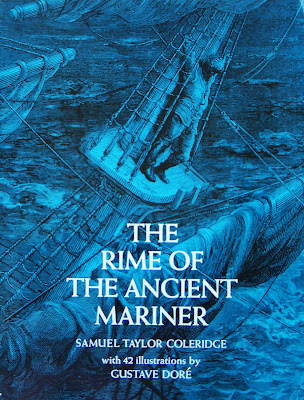The first time I´ve read -part of- this poem written by Coleridge, was in the introduction of the book Frankenstein, by Mary Shelley. There, I´ve learnt that she was inspired by Coleridge´s descriptions for the beginning and the end of her novel.
Remember the creature (it had never had a name) stays somewhere in the Artic Pole, and it is not clear if he will die or not.
Last year, I had to download The Rime of the Ancient Mariner for my son, for his literature class, among other classics, and thought it was time for me to read it completely. So, I´ve downloaded it to my tablet too, but before I could start reading it, I came across with this wonderful edition, with 42 illustrations by Gustave Doré, at the Public Library of Huntington Beach. I feel really fortunate for my new treasure acquisition.
From wikipedia:
The Rime of the Ancient Mariner (originally The Rime of the Ancyent Marinere) is the longest major poem by the English poet Samuel Taylor Coleridge, written in 1797–98 and published in 1798 in the first edition of Lyrical Ballads. Modern editions use a later revised version printed in 1817 that featured a gloss. Along with other poems in Lyrical Ballads, it was a signal shift to modern poetry and the beginning of British Romantic literature.

























